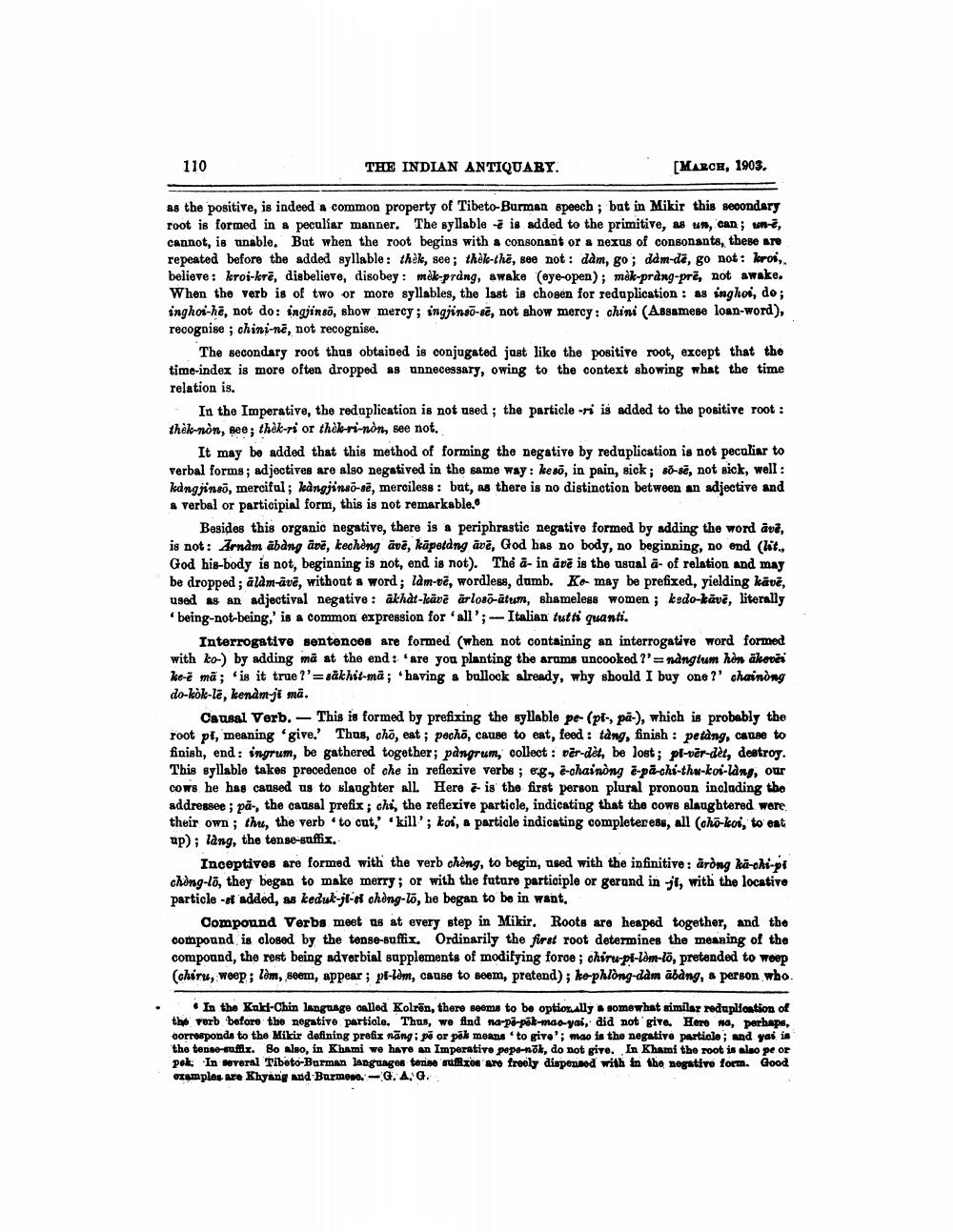________________
110
THE INDIAN ANTIQUARY.
MARCE, 1903.
as the positive, is indeed a common property of Tibeto-Burman speech; but in Mikir this secondary root is formed in a peculiar manner. The syllable é is added to the primitive, as un, can; we, cannot, is unable. But when the root begins with a consonant or a nexus of consonants, these are repeated before the added syllable: thèk, see; thèk-thë, see not: dam, go; dam-dē, go not: Ieroi, believe: kroi-krē, disbelieve, disobey: mók-prong, awake (eye-open); mek-prang-prē, not awake. When the verb is of two or more syllables, the last is chosen for redaplication : as inghoi, do; inghoi-hē, not do: ingjingo, show mercy; ingjinso-sē, not show mercy: chini (Assamese loan-word), recognise ; chini-nē, not recognise.
The secondary root thus obtained is conjugated just like the positive root, except that the time-index is more often dropped as unnecessary, owing to the context showing what the time relation is.
In the Imperative, the reduplication is not used; the particle-ri is added to the positive root: thek-non, see; thek-rs or thèk-ri-non, see not.
It may be added that this method of forming the negative by reduplication is not peculiar to verbal forms; adjectives are also negatived in the same way: keso, in pain, sick; ső-së, not sick, well : kdngjinsō, merciful; kangjinsō-sē, merciless : bat, as there is no distinction between an adjective and & verbal or participial form, this is not remarkable.
Besides this organic negative, there is a periphrastic negative formed by adding the word ave, is not: Arnam abang ādē, kechòng äve, kāpełdng avē, God has no body, no beginning, no end (lit., God his body is not, beginning is not, end is not). The a- in avē is the usual a- of relation and may be dropped ; aldm-āvē, without a word; làm-vē, wordless, dumb. Ke may be prefixed, yielding kavē, used as an adjectival negative : akhat-kāvē ärlosa-ātum, shameless women ; kedo-käve, literally being-not-being,' is a common expression for all'; Italian tutti quanti.
Interrogative sentences are formed (when not containing an interrogative word formed with ko-) by adding må at the end : 'are you planting the arums uncooked ?'= nangtum hòn ākovēti ko-ë mā; is it true?'=såkhit-mā; having a bullock already, why should I buy one?' chainong do-kòk-lë, kendm ji ma.
Causal Verb. - This is formed by prefixing the syllable pe- (pls, på-), which is probably the root pl, meaning "give.' Thus, cho, eat; pecho, cause to eat, feed : tàng, finish : petang, canse to finish, end: ingrum, be gathered together; pangrum, collect : ver-det, be lost; pl-vēr-det, destroy. This syllable takes precedence of che in reflexive verbs; eg, e-chainòng e-på-chi-thu-koi-làng, our cows he has caused us to slaughter all. Here is the first person plural pronoun including the addressee; pä-, the causal prefix; chi, the reflexive particle, indicating that the cows slaughtered were their own; that, the verb to cut," kill'; koi, a particle indicating completeness, all (cho-koi, to eat up); lang, the tense-suffix.
Inceptives are formed with the verb chòng, to begin, used with the infinitive: äròng ka-chi-pi chong-lo, they began to make merry; or with the future participle or gerund in ji, with the locative particle -- added, as keduk-jt-hi chéng-lo, he began to be in want,
Compound Verbs meet us at every step in Mikir. Roots are heaped together, and the compound is closed by the tense-suffix. Ordinarily the first root determines the meaning of the compound, the rest being adverbial supplements of modifying force; chirupt-lom-lo, pretended to weep (chiru, weep; lèm, seem, appear; pl-lèm, cause to seem, pretend); ko-phlòng-dam abang, & person who
In the Kal-Chin language onlled Kolrān, there seems to be optionally somewhat similar reduplication of the verb before the negative particle. Thus, we find na-pa-pök-mao-yas, did not give. Here na, perhaps, corresponds to the Mikir defining prefix năng: po or pak means to give'; mao is the negative partiolo; and gas is the tense-suffix. Bo also, in Khami we have an Imperative pepe-nok, do not give. In Khami the root is also pe or pok. In leveral Tibeto-Burman languages tonige waffles are freely dispensed with in the negative form. Good examples are Khyang and Burmese G. A, G.




